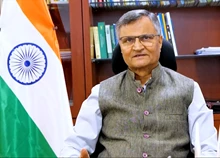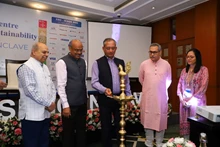
While acknowledging the importance of the Budget debate in Parliament, the Prime Minister stated that the government has gone a step further and has started a new tradition of brainstorming with stakeholders after the Budget for the last few years. "This is critical in terms of implementation and time-bound delivery. This also ensures that every penny of taxpayer money is used properly," he said.
The Prime Minister stated that, in addition to money, political will is required for the development. The Prime Minister emphasized the importance of good governance and constant monitoring to achieve the desired goals, saying, "The more emphasis we put on good governance, the easier our goal of reaching the last mile will be accomplished." He used the examples of new approaches to immunization and vaccine coverage in Mission Indradhanush and the Corona pandemic to demonstrate the importance of good governance in last-mile delivery.
The Prime Minister explained the thinking behind the saturation policy, saying that the approach of reaching the last mile and the saturation policy complement each other. He stated that, unlike in the past, when the poor ran after the government for basic necessities, the government is now coming to their doorstep. "The day we decide that every basic facility will be provided to every citizen in every area, then we will see what a big change will come in the work culture at the local level."
"This is the motivation behind the saturation policy. When our goal is to reach everyone, there is no room for discrimination or corruption. Only then will we be able to achieve our goal of reaching the last mile," the Prime Minister added. The Prime Minister cited the PM SVANidhi Scheme, which linked street vendors to formal banking, the Development and Welfare Board for De-notified, Nomadic, and Semi-Nomadic Communities, 5 lakh village common service centres, and a tele-medicine milestone of 10 crore cases as examples of this approach.
According to the Prime Minister, this year's Budget has paid special attention to the mantra of reaching out to tribal and rural areas. He stated that the Jal Jeevan Mission has been allocated thousands of crore rupees for this purpose. He stated that work on more than 60 thousand Amrit Sarovars has begun, with 30 thousand Sarovars already completed.
"These campaigns are improving the standard of living of those Indians living far and wide, who have been waiting for such facilities for decades. We don't have to end here. We must develop a mechanism for new water connections as well as a pattern of water consumption. "We also need to look at what we can do to strengthen the water committee," he said.
The Prime Minister asked the stakeholders to discuss how to connect housing with technology in order to build strong but affordable houses, find simple ways to benefit from solar power, and make group housing models acceptable in both urban and rural areas. He stated that this year's budget included Rs 80 thousand crore for low-income housing.
"For the first time, the country is tapping the enormous potential of our country's tribal society on this scale," said the Prime Minister. Tribal development has also been prioritized in this budget." Referring to the substantial allocations for staffing the Eklavya Residential Schools, the Prime Minister asked the audience to consider feedback from teachers and students from these schools, as well as how students from these schools can gain exposure to big cities. He asked them to think about how to set up more Atal Tinkering Labs in these schools, as well as workshops on startup-related topics.
According to the Prime Minister, a special mission for the most deprived tribal communities is being launched for the first time. "We have to rapidly provide facilities to our tribal friends in more than 22 thousand villages in more than 200 districts of the country. In this regard, the Prime Minister also mentioned Pasmanda Muslims. This budget also includes a goal of eliminating sickle cell disease entirely. A whole-of-nation approach is required for this. As a result, "every stakeholder involved in health will have to work quickly," he added.
According to the Prime Minister, the Aspirational District Program has proven to be a successful model for Reaching The Last Mile. Taking this approach a step further, an Aspirational Block programme is being launched in 500 blocks across the country. "For the Aspirational Block programme, we must work with comparative parameters in the same way that we worked with Aspirational Districts. We also need to create a competitive environment at the block level," the Prime Minister concluded.











